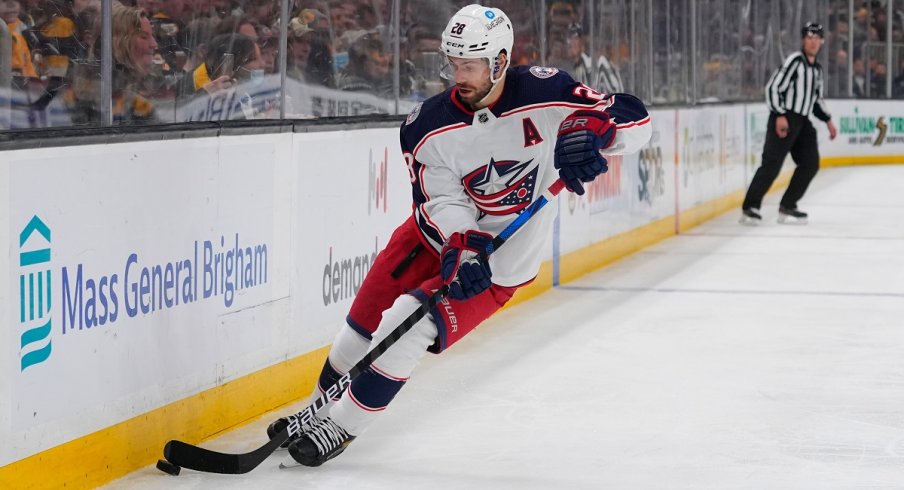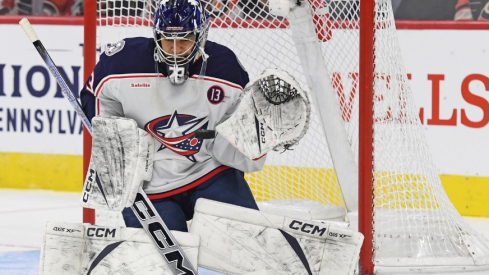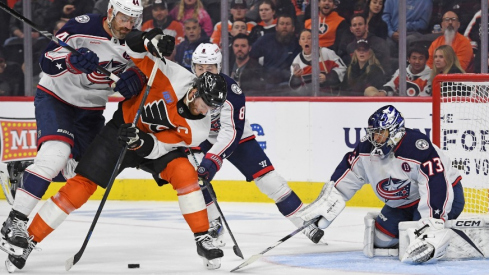Oliver Bjorkstrand is the poster child of the draft-and-develop model that the Columbus Blue Jackets aspire to target, select, and keep long-term.
Drafted in the third round of the 2013 NHL Draft by the Blue Jackets, Bjorkstrand was a steady riser throughout the organization, playing a key role in the AHL Cleveland Monster's Calder Cup championship before playing 382 regular-season NHL games, starting low in the lineup before becoming one of the club's best players over the past several years. The 27-year-old has led the Blue Jackets in points each of the past two seasons, playing an honest, consistent, and exemplary brand of hockey that should be commended. He's a 'get you to' and a 'get you through' type of player.
It's why it stings that he was the player that was traded to become cap compliant after signings of high-profile players like Johnny Gaudreau, and, more recently, Patrik Laine.
And it wasn't supposed to happen this way. Bjorkstrand was signed to a team-friendly contract at $5.4M through 2025-26. He's underpaid today, he'll be a complete bargain in four seasons. And while it wasn't supposed to happen this way, ultimately, it had to end this way.
The Blue Jackets did what the Philadephia Flyers were unwilling to do - find a way to fit a Hart Trophy-contending forward in his prime into a cap-crunched roster. The credit card bill finally came due, and, with dwindling cap space across the NHL, the Blue Jackets took "the best of the no-good options", per GM Jarmo Kekalainen, sending Bjorkstrand to the Seattle Kraken for two mid-round draft picks.
The other players that the Blue Jackets would have likely preferred to part with, including Gus Nyquist and Jakub Voracek, would have probably had to have been packaged with top prospects and/or high draft picks just to get their salaries off the books. The Blue Jackets needed a life jacket. They were thrown anvils.
That isn't a surprise, but it is the cost of doing business.
I've seen a lot of vitriol on social media for someone like Erik Gudbranson, who was signed for four years at $4M per season just hours before the Blue Jackets signed Gaudreau. The argument goes: they had cap space flexibility, and then they didn't. That part is true, but what's not true is that Gudbranson is to blame.
Even after trading Bjorkstrand, the Blue Jackets still have a surplus of NHL forwards. Per Cap Friendly, they're the only NHL franchise that has more than 23 players on their 23-man roster (they have 24). Trading Bjorkstrand at least makes the calculation a little bit clearer. Most can agree that the following 10 players will be fixtures on the opening night roster (barring injury): Gaudreau, Laine, Nyquist, Voracek, Boone Jenner, Jack Roslovic, Alexandre Texier, Cole Sillinger, Eric Robinson, Sean Kuraly.
Most NHL teams roster 14 forwards and dress 12. That leaves four roster and two lineup spots for the following seven forwards: Kirill Marchenko, Yegor Chinakhov, Justin Danforth, Mathieu Olivier, Kent Johnson, Liam Foudy, and Emil Bemstrom (who is still an unsigned RFA). Foudy, Olivier, and Bemstrom would need to clear waivers to be sent to the AHL. The sign of a healthy organization is for players to be 'overripe' in the AHL, so sending players like Marchenko, Chinakhov, and Johnson to the AHL is a possibility (though it seems unlikely).
Perhaps the simple solution is the Blue Jackets move on from Bemstrom, who has had ample opportunities to prove that he's an NHL contributor, or Foudy, who has shown that he's probably a bottom-six forward when it's all said and done. Maybe they see Olivier as overkill now that Gudbranson is in the fold.
Regardless, the point is that the Blue Jackets had too many forwards, even without considering the salary cap implications. Who can say how many of the young, promising players, like Marchenko, Chinakhov, Johnson, etc. are top-six players with brighter futures than Bjorkstrand. At the minimum, at least one or more will have an opportunity to showcase themselves.
Bjorkstrand was everything that was promising about this organization, a shining light through and through. His void in the lineup will be noticeable at first, and hopefully over time will be filled and replaced by a youngster. But while it's unfortunate that Bjorkstrand had to be the one to go, it was the right call to sign Gaudreau.
"Players (of) this caliber are not very often available," Kekalainen said after the signing. "He wanted to come here, so you can't pass up an opportunity like this."
Kekalainen is right. You wanna make an omelet, you gotta break some eggs.


